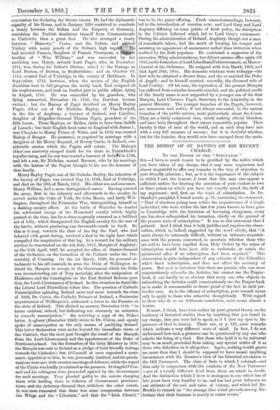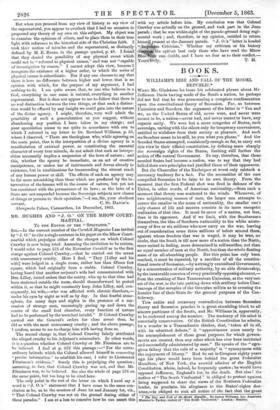THE BISHOP OF ST. DAVID'S ON HIS RECENT CHARGE.
To THE EDITOR OF THE "SPECTATOR."
SIR,-I have so much reason to be gratified by the notice which you have taken of my charge, that it may seem ungracious and almost ungrateful to offer any remarks in the way of objection to your friendly criticism ; but, as it is the importance of the subject to which I owe the honour, I trust that this may also appear a sufficient motive for drawing the attention of your readers to two or three points on which you have not exactly seized the drift of my argument ; and, first, on the topic of subscription. In Dr. Stanley's pamphlet I found a note, p. 31, containing the statement,
"That of nineteen young men within the acquaintance of a single individual, who were within the last few years known to have gone to Cambridge with the intention of becoming clergymen, every one has since reiinquished his intention, chiefly on the ground of the present state of subscription." It was to this statement that I pointed. And I think that it both justifies and requires the obser- vation, which is, indeed, suggested by the word chiefty, that "it must always be extremely difficult, without an intimate acquaint- ance with the persons concerned, to ascertain whether those who are said to have been repelled from Holy Orders by the terms of subscription would have been able to undertake or retain the ministerial office if no subscription had been required." This observation is quite independent of any estimate of the difficulties which beset subscription, and does not affect the accuracy of yours. But as it is notorious that there are persons who can most conscientiously subscribe the Articles, but cannot use the Prayer- book, it can hardly be so obvious that every one who objects to subscribing the Articles could conscientiously use the Prayer-book as to make it unreasonable to desire proof of the fact in each par- ticular case. As to the efficacy of subscription, your remark seems only to apply to those who subscribe thoughtlessly. With regard to those who do so on deliberate conviction, mine seems almost a truism.
It must, I think, have been rather by your general theory on the tendency of historical studies than by anything that you found in my charge, that you were led to speak as if I shut my eyes to the presence of God in history. There are, at p. 123, some remarks which indicate a very different state of mind. In fact, I do not understand how such a presence can be questioned by any one who admits the being of a God. But those who hold it to be universal may be as much precluded from taking any special notice of it as those who disbelieve in it altogether. Again, nothing would grieve me more than that I should be supposed to have meant anything inconsistent with Mr. Maurice's view of the historical revelation in the Old Testament. The class of facts to which I referred—and that only in comparison with the contents of the New Testament —are of a totally different kind from those on which he dwells. And the distinction which I drew is analogous to one which has of late years been very familiar to us, and has had great influence on our estimate of the end and value of history, and which led M r. Buckle to remark on " the strange idea which prevails among his- torians that their business is merely to relate events." But when you proceed from my view of history to my view of the supernatural, you appear to overlook that I had no occasion to propound any theory of my own on this subject. My object was to examine the opinions of others, and to place them in their true light with reference to the historical side of the Christian faith. I took their notion of miracles and the supernatural, as distinctly defined by M. E. Renan in the passage quoted, p. 49. I found that they denied the possibility of any physical event which could not be "referred to physical causes," and was not "capable of investigation by reason." I cannot adopt this view, because I recognize the existence of a higher order, to which the series of physical causes is subordinate. But if any one chooses to say that there is here no difference between higher and lower, that is an opinion with which, for the purpose of my argument, I had nothing to do. I am quite aware that, to one who believes in a God, everything in one sense is natural, everything in another supernatural. But it does not appear to me to follow that there is no real distinction between the two things, or that such a distinc- tion would be effaced by any insight we could gain into the nature of the divine agency. I might, therefore, very well admit the possibility of such a generalization as you suggest, without abandoning any position I have taken in my charge ; and your speculation seems to me quite in accordance with one to which I referred in my letter to Dr. Rowland Williams, p. 55, where I observed, "There are theologians who, while agreeing on the main point, that is the interposition of a divine agency in a manifestation of external power, as constituting the essential character of every true miracle, do not admit that such an interpo- sition necessarily implies a suspension of the laws of nature ; and this, whether the agency be immediate, as an act of creative omnipotence, or makes use of instruments and forces already in existence, but in combinations far transcending the utmost reach of any human power or skill. The effects of such an agency may be far more astonishing than those which are produced by the in- tervention of the human will in the course of nature, but yet not less consistent with the permanence of its laws ; as the laws of a State are not suspended because the Sovereign subjects new classes of things or persons to their operation."—I am, Sir, your obedient































 Previous page
Previous page